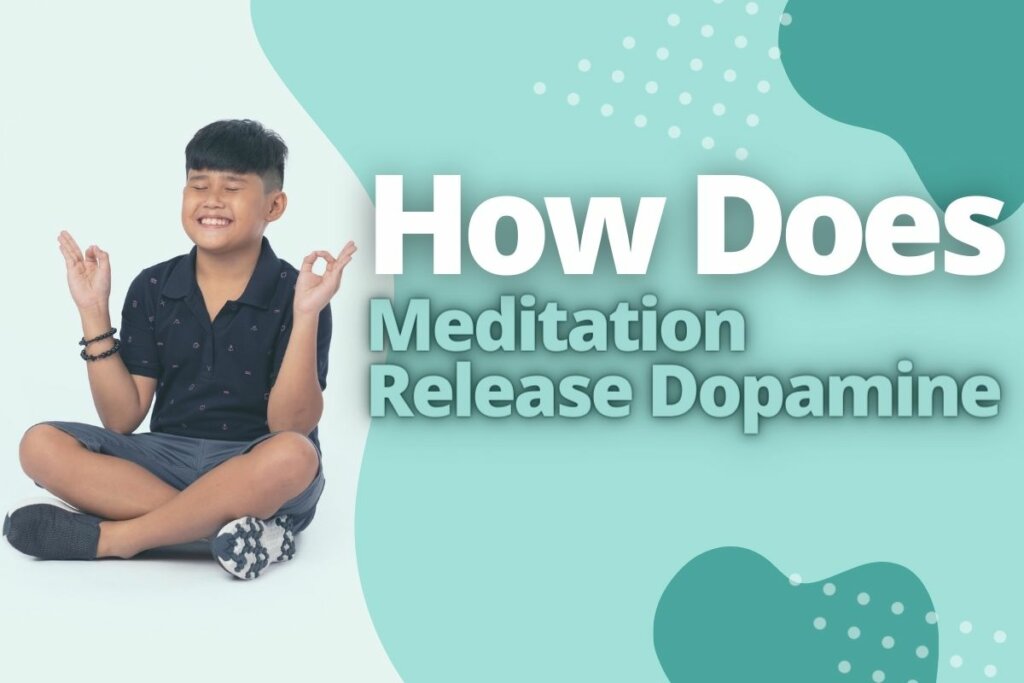What do you think happens to your brain while you meditate? Is there a connection between meditation and the release of Dopamine?
Meditation is becoming more and more popular. However, what precisely is it, and how does it function? In this post, I will answer these questions and more.

Here’s The Answer To Does Meditation Release Dopamine
Yes, meditation releases Dopamine. Dopamine is a neurotransmitter that’s responsible for feelings of pleasure and well-being. It’s often called the happy hormone.
Since Dopamine is released when you meditate, it makes sense that the activity would make you feel good and experience a sense of well-being. Yet, Dopamine doesn’t only encourage feelings of well-being. It can also cause stress, anxiety, and fear.
This is how it works: when you practice meditation, your brain becomes more active and creates new neural pathways. These new pathways allow for the release of Dopamine when you meditate—and not only that, but they also allow for a positive outlook on life.
This is why meditation can be so beneficial! The more energy spent on creating these new neural pathways, the less energy there will be spent on negative thoughts or actions.
It’s like a self-cleaning oven; all you have to do is turn it on and walk away!
How Does Meditation Release Dopamine?

Dopamine is released when we experience something pleasurable, like eating a delicious meal or spending time with a loved one.
This dopamine release is part of the brain’s reward system, which helps us feel good and motivates us to keep doing things that make us happy.
There are a few theories as to how meditation increases dopamine levels. One theory is that meditation increases blood flow to the brain, which helps to nourish and repair dopamine-producing neurons.
Another theory is that meditation helps to release dopamine-producing brain chemicals.
Whatever the mechanism, the fact that meditation can increase dopamine levels is good news for those looking for a natural way to boost their mood and motivation. Meditation is a safe and easy way to improve your mental well-being.
Is There A Benefit In the Release Of Dopamine From Meditation?
There is a chemical that is released in the brain called Dopamine, and it can cause feelings of pleasure and motivation. It’s possible that regular meditation can help you live a healthier life in general.
The release of Dopamine when meditating has been proven by science and can help people who suffer from depression or anxiety as well as those who want to improve their overall health.
- Dopamine is involved in the reinforcement of behaviors that are essential for survival, such as eating and drinking. It is also involved in the reward system that reinforces certain behaviors, such as those that lead to reproduction.
- Dopamine is also involved in the regulation of stress hormones and blood pressure. It has been shown to be beneficial in the treatment of conditions like ADHD and Parkinson’s disease.
- Meditation has been shown to be beneficial in the treatment of many conditions, including depression, anxiety, and chronic pain. Meditation has also been shown to be effective in reducing stress and improving cognitive function.
Are There Any Risks To Meditating From the Release of Dopamine?
There are a few risks associated with meditation. The biggest risk is that you might not enjoy it. Some people just don’t like meditating, and that’s okay—there are plenty of other things to do in life.
The second biggest risk is that you might overdo it. If you spend too much time meditating, your brain will start to crave more Dopamine, which will make it harder for you to stop meditating.
The third biggest risk is that you might not be able to meditate at all. For some people, this means they won’t be able to find the time; for others, this means they won’t have the patience or self-control necessary for regular practice (which can lead back to the first two risks).
Is There A Direct Correlation Between Meditation And Dopamine Production?

As you may or may not know, Dopamine is a neurotransmitter that is produced in the brain. It’s also produced in the gut and plays a role in regulating many functions, including movement, cognition, memory, and mood.
Dopamine production can be increased through various activities such as eating certain foods (like chocolate), listening to certain types of music, or even taking part in some exercises.
However, as with most things related to the body—there are ways you can naturally increase your dopamine production without having to do any of those things above!
Are There Any Benefits Of Higher Dopamine Levels?
Here are some of the benefits of higher dopamine levels:
- Increased focus and concentration
- Reduced pain
- Improved mood and reduced depression
- Improved memory and recall
- Enhanced energy levels and stamina, increased motivation, confidence, and creativity. You will feel more awake during the day without needing as much sleep.
Is Dopamine Released Immediately after Meditation?
It can take as little as 2 minutes for meditation to release Dopamine, but the effects of regular practice can last for hours, days, and even years.
It is said that it takes about 21 days for something to become a habit. So, if you’re looking to release Dopamine through meditation, it might take around three weeks of consistent meditation before you start to see changes in your dopamine levels.
How Long Do Effects Last For When Meditating And Dopamine?
The effects of dopamine release are short-lived and depend on the type of meditation you practice. In addition, the effects are dependent on how often you meditate.
If you want to keep reaping these benefits, it’s important to stick with your practice for a while (and maybe even bring along an activity that can make it more enjoyable).
Can Anyone Benefit From Meditating And Further Release Dopamine?

Yes! Meditation is a healthy practice for everyone. It helps reduce stress and improve sleep, focus, and memory. These five benefits can help anyone who practices it.
Meditation has many other health benefits as well, such as helping with pain management and reducing anxiety disorders. The benefits of meditation are endless, so if you want to improve your overall health, then try meditating for yourself!
Can Over-Meditation Cause To Release Less Dopamine?
Yes, it is possible for over-meditation to lead to the release of less Dopamine. When addicts meditate, they are trying to soothe and focus their minds, but the techniques they use can sometimes have the opposite effect.
The chemical messenger dopamine is involved in many addictive behaviors, and the production of Dopamine is increased by positive affect and decreased by negative affect.
Therefore, if addicts are constantly in a state of negative affect due to over-meditation, this can lead to a decrease in dopamine production and increased addictive behavior.
Additionally, Dopamine is involved in many cognitive processes, and over-meditation can lead to mood swings and cognitive impairments due to the changes in dopamine levels in the central nervous system.
Is The Effect Of Dopamine Dependant On How Often You Meditate?
It depends on what you’re looking for. If you are meditating to improve your focus and attention, then it will take longer than if you were meditating in order to relax or reduce stress.
Also, the length of time that it takes for your dopamine levels to increase will depend on how often you are meditating.
If someone asks me how much time they should spend meditating each day, I tell them what works best for me is 10 minutes every morning (after I wake up) and another 10 minutes before bedtime (after I go through my nightly routine).
This gives me a good balance between relaxation at night and being able to stay focused during the day.
Alternatives For Dopamine Release Naturally Apart From Meditation

Alternatives for dopamine release naturally apart from meditation:
- Exercise. Exercise can be a great way to release Dopamine and feel good, but it’s important not to over-exert yourself. Try starting with a 10-minute workout video every morning before you get out of bed.
- Sleep! Your brain is able to replenish itself while you sleep. When you wake up after eight hours of restful slumber, your mood will most likely be better than if you had been awake all night long!
Conclusion
In this blog post, we discussed whether meditation could release Dopamine. Dopamine is one of the neurotransmitters in the brain. It plays a role in the reward system, and it is also linked to depression.
Dopamine is part of the reward system in your brain. It is released when you have a happy, exciting, or fulfilling experience. It is also part of the reward system when you exercise.
When you exercise, it releases Dopamine, which keeps you motivated to exercise. So go ahead, give meditation a try! You may have heard all the claims about how good it is for you, but now you can also be sure that your brain is getting a double dose of benefits.
Not only will your brain thank you for taking care of it today, but it will thank you tomorrow when you sit down to meditate again.
Frequently Asked Questions
Do different styles of meditation release different amounts of Dopamine?
There is no study that shows different styles of meditation affects dopamine release. Dopamine is a neurotransmitter that is connected with the brain’s reward and pleasure center.
Which Type Of Meditation Is Best For Dopamine Release?
Nervous system relaxation is the main reason why meditation is considered to be one of the best ways to stimulate dopamine release. So normal meditation will do the trick.
Why Isn’t Meditation More Popular As An Activity?
The reason why meditation is not more popular as an activity is because people do not understand its benefits of it. Meditation helps to relax and unwind and also helps to relieve stress and anxiety.
Does Dopamine release from meditation alter the mood?
The hormone dopamine is a neurotransmitter present in the brain, which regulates the brain’s reward and pleasure center. So yes, the release of Dopamine from meditation can temporarily alter a person’s mood.
My name is Mugen Seki, and I’m a painter and yoga enthusiast who is passionate about bringing together art and exercise in ways that help people connect with their inner selves. When I’m not painting, I’m practicing yoga. And when I’m not doing either of those things, I’m usually thinking about them.
- How to Hold a Yoga Pose for 4 to 5 Minutes – Practical Tips
- A Guide to Finding the Perfect Yoga Mat for Carpet Floors
- Kneeling Yoga Poses: Hands, Knees, and Position Reference Guide
- Is Meditation Bad For Christians (The Surprising Answer)
- Is Meditation Bad For You (Don’t Believe Everything)
- Will I Get Better At Meditation (Understand The Secret)














